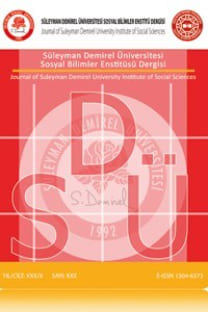Kariyer Uyum Yetenekleri Ölçeği: Geçerlilik ve Güvenilirlik Çalışması
Bu araştırma, literatürde kariyer uyum yetenekleri ölçeği (career adaptabilities scale) olarak yer alan ölçüm modelinin Türkiye’deki uygunluğunun test edilmesini amaçlamaktadır. Mehmet Akif Ersoy Üniversitesi bünyesindeki 3 yüksekokulda öğrenim gören 474 öğrenciye ait verilere yapısal eşitlik modeli (YEM) vasıtasıyla doğrulayıcı faktör analizi uygulanmıştır. Analiz sonucunda elde edilen bulgular; kariyer uyum yetenekleri ölçüm modelinin veri ile uyumunun iyi düzeyde olduğunu ve Türkiye’de benzer araştırmalarda kullanılabileceğini ortaya koymaktadır. Araştırmada ayrıca, öğrencilerin kariyer uyum yeteneği ortalamalarının belirli kriterlere göre anlamlı düzeyde farklılaştığı görülmüştür
Anahtar Kelimeler:
Kariyer Uyumu, Kariyer Geliştirme, Bireysel Kariyer Yönetimi
CAREER ADAPTABILITIES SCALE: A STUDY OF VALIDITY AND RELIABILITY
This study, aims to adapt an international measurement model in Turkey which is known as career adaptabilities scale. The sample has been constituted from 474 students who belong to three schools of Mehmet Akif Ersoy University. Using Structural Equation Modelling (SEM), confirmatory factor analysis has been applied on collected data. The results revealed that the measurement model had pretty high googness of fit and it could have been be used in Turkey. In addition to these results, it has been observed that career adaptability scores of students are differentiates on significant levels according to certain criterias
___
- AYYILDIZ, H., CENGİZ, E., “Pazarlama Modellerinin Testinde Kullanılabilecek Yapısal Eşitlik Modeli (YEM) Üzerine Kavramsal Bir İnceleme”, Süleyman Demirel Üniversitesi İktisadi ve İdari Bilimler Dergisi, 11(1), ss. 63-84, 2006.
- BAGOZZI, R. P., YOUJAE, YI., “On the Evaluation of Structural Equation Models”, Academy of Marketing Science, 16 (1), pp. 74-94, 1998.
- CREED, P.A., FALLON T. ve HOOD, M., “The relationship between career adaptability, person and situation variables, and career concerns in young adults”, Journal of Vocational Behavior, 74, pp. 219-229, 2009.
- DUFY, R.D., “Sense of Control and Career Adaptability Among Undergraduate Students”, Journal Of Career Assessment, 18(4), pp. 420-430, 2010.
- HIRSCHI, A. ve VONDRACEK F.W., “Adaptation of career goals to self and opportunities in early adolescence”, Journal of Vocational Behavior, 75, pp. 120-128, 2009.
- HOU, Z., LEUNG, S.A., LI, X., LI, X. ve XU, H., “Career Adapt-Abilities Scale—China Form: Construction and initial validation”, Journal of Vocational Behavior, article in pres, doi:10.1016/j.jvb.2012.01.006
- JORESKOG, K. ve SORBOM, D., “LISREL 8: Structural Equation Modeling with the SIMPLIS Command Language. Chicago, IL: Scientific International Software”, 1993.
- KALAYCI, Ş., “SPSS Uygulamalı Çok Değişkenli İstatistik Teknikleri”, 3. Baskı, Asil Yayın Dağıtım, Ankara, 2008.
- KLEHE, U., ZIKIC, J., VAN VIANEN A.E.M. ve DE PATER, I.E., “Career adaptability, turnover and loyalty during organizational downsizing”, Journal of Vocational Behavior, 79, pp. 217-229, 2011.
- KLINE, R.B., “Principles and Practice of Structural Equation Modeling”, Third Edition, The Guilford Press, New York, 2011.
- MCMAHON, M., WATSON M. ve BIMROSE J., “Career adaptability: A qualitative understanding from the stories of older women”, Journal of Vocational Behavior, 80, pp. 762-768, 2012.
- MITTENDORFF, K., BROK, P. ve BEIJAARD, D., “Students’ perceptions of career conversations with their teachers”, Teaching and Teacher Education, 27, pp. 515-523, 2011.
- NOTA, L., GINEVRA, M.C. ve SORESI, S., “The Career and Work Adaptability Questionnaire (CWAQ): A first contribution to its validation”, Journal of Adolescence, article in press, pp.1-13, http://dx.doi.org/10.1016/j.adolescence.2012.06.004, 2012.
- ROSSIER J., ZECCA, G., STAUFFER, S.D., MAGGIORI, C. ve DAUWALDER, J.P., “Career Adapt-Abilities Scale in a Frenchspeaking Swiss sample: Psychometric properties and relationships to personality and work engagement”, Journal of Vocational Behavior, article in pres, doi:10.1016/j.jvb.2012.01.004, 2012.
- SAVICKAS, M.L. ve PORFELI, E.J. “The Career Adapt-Abilities Scale: Construction, reliability, and measurement equivalence across 13 countries”, Journal of Vocational Behavior, 80, pp. 661-673, 2012. SAVICKAS, M.L., “Career Adaptability: An Integrative Construct for LifeSpan, Life-Space Theory”, The Career Development Quarterly, 45, pp. 247-259, 1997.
- SAVICKAS, M.L., NOTA, L., ROSSIER, J., DAUWALDER, J.P., DUARTE, M.E., GUICHARD, J., SORESI, S., ESBROECK, R.V. ve VAN VIANEN, A.E.M., “Life designing: A paradigm for career construction in the 21st century”, Journal of Vocational Behavior, 75, pp. 239-250, 2009.
- VIANEN, A.E.M., KLEHE, U. KOEN, J. ve DRIES, N., “Career adaptabilities scale — Netherlands form: Psychometric properties and relationships to ability, personality, and regulatory focus”, Journal of Vocational Behavior, article in pres, doi:10.1016/j.jvb.2012.01.002, 2012.
- YILMAZ, V., “LISREL ile Yapısal Eşitlik Modelleri: Tüketici Şikayetlerine Uygulanması”, Anadolu Üniversitesi Sosyal Bilimler Dergisi, 4(1), ss. 77-90, 2004.
- YOUSEFI, Z., ABEDI, M., BAGHBAN, I., EATEMADI, O. ve ABEDI, A., “Personal and Situational Variables, and Career Concerns: Predicting Career Adaptability in Young Adults”, The Spanish Journal of Psychology, 14(1), pp. 263-271, 2011.
- SKORIKOV, V., “Continuity in adolescent career preparation and its effects on adjustment”, Journal of Vocational Behavior, 70, pp. 8-24, 2007.
- Yayın Aralığı: Yılda 3 Sayı
- Başlangıç: 2005
- Yayıncı: Süleyman Demirel Üniversitesi
Sayıdaki Diğer Makaleler
Girişimcilik Eğilimi: Celal Bayar Üniversitesi Öğrencileri Üzerine Bir Araştırma
Süleyman DEMİRCİ, Hasan ARSLAN
TR61 Bölgesine Lojistik Açıdan Bir Bakış
Bekir Sami OĞUZTÜRK, Behiç ÇETİN
Likidite ve Karlılık Arasındaki İlişki - İMKB 100 İmalat Sektörü Üzerine Ampirik Bir Çalışma
19. Yüzyıl Türk Yüksek Öğretiminde İşletme Eğitimi
İşçi Davranışlarının İşverenin İşten Çıkarma Kararı Üzerindeki Etkileri: Isparta İli Örneği
Hacı Bayram Veli'nin Şiirinde Şehir Metaforu
Kariyer Uyum Yetenekleri Ölçeği: Geçerlilik ve Güvenilirlik Çalışması
